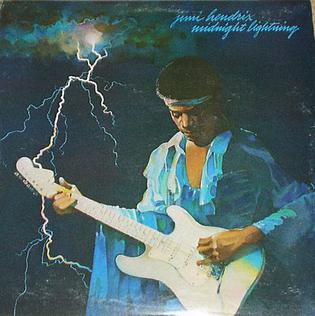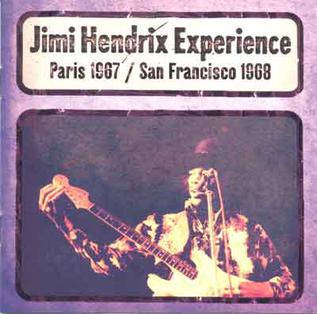
Electric Ladyland is the third and final studio album by the Jimi Hendrix Experience, released in October 1968. A double album, it was the only record from the Experience with production solely credited to Hendrix. The band's most commercially successful release and its only number one album, it was released by Reprise Records in the United States on October 16, 1968, and by Track Records in the UK nine days later. By mid-November, it had reached number 1 on the Billboard Top LPs chart, spending two weeks there. In the UK it peaked at number 6, where it spent 12 weeks on the British charts.

Are You Experienced is the debut studio album by the Jimi Hendrix Experience, released in May 1967. The album was an immediate critical and commercial success, and is widely regarded as one of the greatest albums of all time. It features Jimi Hendrix's innovative approach to songwriting and electric guitar playing, which soon established a new direction in psychedelic and rock music as a whole.
Blues rock is a fusion genre and form of rock music that relies on the chords/scales and instrumental improvisation of blues. It is mostly an electric ensemble-style music with instrumentation similar to electric blues and rock. From its beginnings in the early to mid-1960s, blues rock has gone through several stylistic shifts and along the way it inspired and influenced hard rock, Southern rock, and early heavy metal.

William Frederick Gibbons is an American rock musician, best known as the guitarist and primary vocalist of ZZ Top. He began his career in Moving Sidewalks, who recorded Flash (1969) and opened four dates for the Jimi Hendrix Experience. Gibbons formed ZZ Top in late 1969 and released ZZ Top's First Album in early 1971. He has also maintained a solo career in recent years, starting with his first album Perfectamundo (2015).

Axis: Bold as Love is the second studio album by the Jimi Hendrix Experience. It was first released by Track Records in the United Kingdom on December 1, 1967, only seven months after the release of the group's highly successful debut album, Are You Experienced. In the United States, Reprise Records delayed the release until the following month. The album reached the top ten in the album charts in both countries.
"Gypsy Eyes" or "Gipsy Eyes" is a song written by Jimi Hendrix and performed by the Jimi Hendrix Experience for the 1968 album Electric Ladyland. Subsequently, it was released as the B-side of the "Crosstown Traffic" single, which reached number 52 on the US Billboard Hot 100 and number 37 on the UK Official Singles Chart.
"Little Wing" is a song written by Jimi Hendrix and recorded by the Jimi Hendrix Experience in 1967. It is a slower tempo, rhythm and blues-inspired ballad featuring Hendrix's vocal and guitar with recording studio effects accompanied by bass, drums, and glockenspiel. Lyrically, it is one of several of his songs that reference an idealized feminine or guardian angel-like figure. At about two and a half minutes in length, it is one of his most concise and melodically focused pieces.

Band of Gypsys is a live album by Jimi Hendrix and the first without his original group, the Jimi Hendrix Experience. It was recorded on January 1, 1970, at the Fillmore East in New York City with Billy Cox on bass and Buddy Miles on drums, frequently referred to as the Band of Gypsys. The album mixes funk and rhythm and blues elements with hard rock and jamming, an approach which later became the basis of funk rock. It contains previously unreleased songs and was the last full-length Hendrix album released before his death six months later.

First Rays of the New Rising Sun is a compilation album credited to American rock musician Jimi Hendrix, issued in April 1997 on MCA Records. Featuring songs mostly intended for his planned fourth studio album, it was one of the first releases overseen by Experience Hendrix, the family company that took over management of his recording legacy. It reached the album charts in the United States, United Kingdom, and four other countries.

Blues is a compilation album of blues songs recorded by American singer/songwriter/musician Jimi Hendrix. Compiled by interim Hendrix producer Alan Douglas, it was released April 26, 1994, by MCA Records. The album contains eleven songs recorded by Hendrix between 1966 and 1970, six of which were previously unreleased. Hendrix wrote seven of the pieces; other writers include Muddy Waters, Booker T. Jones, and Elmore James. Most are demos, jams, and live recordings, which Hendrix may or may not have completed for release.
"Red House" is a song written by Jimi Hendrix and one of the first songs recorded in 1966 by the Jimi Hendrix Experience. It has the musical form of a conventional twelve-bar blues and features Hendrix's guitar playing. He developed the song prior to forming the Experience and was inspired by earlier blues songs.

South Saturn Delta is a posthumous compilation album by American rock musician Jimi Hendrix. Released in 1997 by Experience Hendrix, it consists of material such as demo tapes, unfinished takes and alternate mixes, and previously released material, most of which Hendrix had been working on prior to his death in 1970.

Kenny Wayne Shepherd is an American guitarist. He has released several studio albums and experienced significant commercial success as a blues rock artist.

Midnight Lightning is a posthumous compilation album by American rock guitarist Jimi Hendrix. It was released in November 1975 by Reprise Records in the US and Polydor Records in the UK. It was the second to be produced by Alan Douglas and Tony Bongiovi and contains demo-type recordings that were overdubbed with musicians who had never played with Hendrix. Despite including reworkings of the popular live songs "Hear My Train" and "Machine Gun", the album was not as well received as its predecessor, peaking at numbers 43 in the US and 46 in the UK.
"Bold as Love" is the title track of Axis: Bold as Love, the second album by the Jimi Hendrix Experience. The song, which closes the album, was written by Jimi Hendrix and produced by band manager Chas Chandler.

Rainbow Bridge is a compilation album by American rock musician Jimi Hendrix. It was the second posthumous album release by his official record company and is mostly composed of recordings Hendrix made in 1969 and 1970 after the breakup of the Jimi Hendrix Experience. Despite the cover photo and subtitle Original Motion Picture Sound Track, it does not contain any songs recorded during his concert appearance for the 1971 film Rainbow Bridge.

Paris 1967/San Francisco 1968 is a posthumous live album by the Jimi Hendrix Experience, released on April 24, 2003, by Dagger Records. The album contains songs from the group's performances at the L' Olympia Theatre in Paris on October 9, 1967, and the Fillmore Auditorium in San Francisco, California, on February 4, 1968. In 2021, an expanded edition focusing on the Paris performance was released by Dagger.

Radio One is a live album by The Jimi Hendrix Experience. It was released posthumously in November 1988 by Rykodisc and compiles tracks recorded between February and December 1967 for broadcasts by BBC Radio. The album peaked at number 30 on the UK Albums Chart while it charted at number 119 on the Billboard 200 in the United States. After Hendrix's family gained control of his legacy, Radio One was supplanted by the more comprehensive BBC Sessions in 1998.
Michael Powers is a blues guitarist and singer who has a varied style. He has fronted various bands since the late 1960s and has released albums from the late 1990s until the 2010s. He has been nominated for several blues and Grammy awards.

Prodigal Son is a studio album by blues musician Michael Powers, released in 2006. A follow up to his previous album Onyx Root, Prodigal Son was well received and gained him more recognition.












